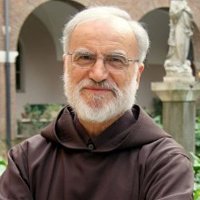Youtube (featured videos)
Good news
- Raniero Cantalamessa
 he Baptism in the Spirit's effectiveness in reactivating baptism consists in this: finally man contributes his part -- namely, he makes a choice of faith, prepared in repentance, that allows the that allows the work of God to set itself free and to emanate all its strength. It is as if the plug is pulled and the light is switched on. The gift of God is finally "untied" and the Spirit is allowed to flow like a ftragrance in the Christian life.
he Baptism in the Spirit's effectiveness in reactivating baptism consists in this: finally man contributes his part -- namely, he makes a choice of faith, prepared in repentance, that allows the that allows the work of God to set itself free and to emanate all its strength. It is as if the plug is pulled and the light is switched on. The gift of God is finally "untied" and the Spirit is allowed to flow like a ftragrance in the Christian life. - Peter Hocken
 During the night between Friday and Saturday, in the early morning hours of 10 June 2017, the Lord called back to Him a great man, Father Peter Hocken.
He died at the age of almost 85. He was a servant of God, a friend, a priest who loyally served the Body of Christ until his last breath, all the world round. The Lord gave him an extraordinary intellect and wisdom, together with the experience of baptism in the Holy Spirit. He also received from God the talent and ability to provide specific and comprehensible theological explanations and descriptions of spiritual experiences that are taking place within the Church, notably after the Second Vatican Council.
During the night between Friday and Saturday, in the early morning hours of 10 June 2017, the Lord called back to Him a great man, Father Peter Hocken.
He died at the age of almost 85. He was a servant of God, a friend, a priest who loyally served the Body of Christ until his last breath, all the world round. The Lord gave him an extraordinary intellect and wisdom, together with the experience of baptism in the Holy Spirit. He also received from God the talent and ability to provide specific and comprehensible theological explanations and descriptions of spiritual experiences that are taking place within the Church, notably after the Second Vatican Council. - Dr. Martin Luther King Jr.
 "I have a dream," he began, "that one day on the red hills of Georgia, sons of former slaves and sons of former slave-owners will be able to sit down together at the table of brotherhood. "I have a dream my four little children will one day live in a nation where they will not be judged by the color of their skin but by the content of their character."
"I have a dream," he began, "that one day on the red hills of Georgia, sons of former slaves and sons of former slave-owners will be able to sit down together at the table of brotherhood. "I have a dream my four little children will one day live in a nation where they will not be judged by the color of their skin but by the content of their character." - Peter Dufka SJ
 We all know, based on our personal experience, that the cooperation with most intelligent people is not often easy. These people usually do not establish friendship easily. It is interesting also that university graduates with an honour degree usually do not fit in to the working environment in the best way and that their high intellect is of a little help in overcoming personal or marriage crises.
We all know, based on our personal experience, that the cooperation with most intelligent people is not often easy. These people usually do not establish friendship easily. It is interesting also that university graduates with an honour degree usually do not fit in to the working environment in the best way and that their high intellect is of a little help in overcoming personal or marriage crises. - Marek Nikolov
 The aim of the “Jesus Heals” prayer gatherings is experiencing the fact that God is Love. He is Love that wants to give itself to other people. God wants to show us His mercy even through healing, signs, wonders, and miracles.
The aim of the “Jesus Heals” prayer gatherings is experiencing the fact that God is Love. He is Love that wants to give itself to other people. God wants to show us His mercy even through healing, signs, wonders, and miracles.
Video
Prorocká výzva Geoffa Poultera pre Slovensko, ktorá sa začína napĺňať.
 Zaujímavá a výpovedná skúsenosť západoeurópskeho muža s hinduizmom, budhizmom, jógou, ezoterikou a okultizmom.
Zaujímavá a výpovedná skúsenosť západoeurópskeho muža s hinduizmom, budhizmom, jógou, ezoterikou a okultizmom.
 Príbeh bývalého teroristu, ktorý dnes spája etniká a kmene.
Príbeh bývalého teroristu, ktorý dnes spája etniká a kmene.
Stephen Lungu
 Hudobníčka Lacey Sturm, bývalá speváčka kapely Flyleaf, bola presvedčenou ateistkou a mala v úmysle vziať si život... ale zrazu sa všetko zmenilo.
Hudobníčka Lacey Sturm, bývalá speváčka kapely Flyleaf, bola presvedčenou ateistkou a mala v úmysle vziať si život... ale zrazu sa všetko zmenilo.
We all are part of a great story. The great story of the world is composed of past and present stories of lives of individual people. The portal mojpribeh.sk is focused on the most important moment of the story of the world and individual, the moment of personal experience of person with God.
Message - Fr. Peter Hocken
Baptism in the Spirit

Fr. Peter Hocken, a historian of the Catholic Charismatic Renewal and the Pentecostal movement over the last century, shares his reflections on the Baptism in the Holy Spirit and its meaning for the Church.
Most leaders in the charismatic renewal over the last forty or more years, whether Catholic or Protestant, would agree that what we call Baptism in the Holy Spirit (BHS) is at the heart of the movement. Virtually all agree that BHS brings a new level of relationship with the living God, Father, Son and Holy Spirit. Virtually all agree that BHS opens the door to the charisms of the Spirit: prophecy, healing, speaking in tongues, etc. The vast majority believe that BHS is a gift for the whole Church, even if a particular style of being charismatic is not for everyone.
However, beyond these basic common convictions, there has been widespread variety as to how BHS is explained and how it fits into church life. I have said “variety” rather than “dispute”, as the differences of understanding have rarely led to major tensions or caused division. In general, charismatic Catholics have sought to explain BHS in relation to sacramental initiation, while most charismatic Evangelicals have followed the Pentecostal pattern and sought to explain BHS in terms of normative Christian experience. However, a few significant Catholic voices took a different position, notably Fr Francis Sullivan, SJ, who understands BHS in terms of a new sending of the Spirit. But the majority Catholic understanding was sacramental, using the language of “release” or of the grace of baptism “coming to conscious expression”. In other words, the grace is there from sacramental baptism (and confirmation), but in BHS it is made visible, it becomes part of our conscious life as a Christian. The Holy Spirit was there, but is now set free. In the Evangelical approach, the Holy Spirit was not there, at least in this way, but now it is given in BHS.
Not enough attention paid to Scriptural evidence
To be honest, I have never been very excited about either of these approaches. I have felt that they do not pay enough attention to the Scriptural evidence. I also felt that they do not pay enough attention to what happens in BHS and how it often comes about, being too focused on fitting the “new thing” into our received theologies. So let us look at these two weaknesses: the Scriptural data in this issue and the relationship to the sacraments in the next.
The term “baptism in the [Holy] Spirit” does not appear in the Scriptures. However, the verbal form “baptize in Holy Spirit” does occur – four times in the context of the baptism of Jesus (Matt. 3: 11; Mark 1: 8; Luke 3: 16; John 1: 33) and twice in relation to the “promise of the Father” fulfilled on the day of Pentecost and at Caesarea in the home of Cornelius (Acts 1: 5; 11: 16). It seems that in the New Testament, this phrase “baptize with Holy Spirit” characterizes the ministry of Jesus himself. It is not just that BHS is something that Jesus does, but that it is to do this that he has come. In this perspective, trying to find out where it fits into our forms of initiation misses the crucial point.
The last days
If we look at the Gospel references to “baptize with Holy Spirit”, it is not hard to see that the framework is eschatological. All four references are presented as sayings of John the Baptist. The “last days” context is particularly evident in the Gospels of Matthew and Luke, where the promise is that Jesus “will baptize with Holy Spirit and with fire”, fire being associated with judgment and with purification (see Mal. 3: 2 - 3). In these two Gospels, this promise is immediately followed by a verse about the final judgment: “His winnowing fork is in His hand, to clear His threshing floor, and to gather the wheat into his granary, but the chaff He will burn with unquenchable fire.” (Luke 3: 17; almost identical in Matt. 3: 12). Here John the Baptist was following in the line of the Old Testament prophets. How, we shall see more in a moment.
The two references in the Acts of the Apostles do not mention the word “fire”, and both are presented as a word of Jesus rather than John the Baptist. Acts presents the day of Pentecost as a fulfilment of this promise. In Acts 1, the Lord says “but before many days you shall be baptized with the Holy Spirit” (Acts 1: 5). And in Acts 11, Peter is said to remember this word of the Lord when the Holy Spirit “fell on” Cornelius and his household, adding: “As I began to speak, the Holy Spirit fell on them just as on us at the beginning.” (Acts 11: 15).
The first Pentecostals at the start of the 20th century believed that the Holy Spirit was being poured out on them as on the 120 disciples on the Day of Pentecost. An early headline of the newspaper from Azusa Street in Los Angeles blazoned the message: “Pentecost has come”. This conviction that BHS is the experience of Pentecost led to the movement being known as Pentecostal. It seems to me that one importance of the BHS terminology is to link this grace with Pentecost. When we avoid the “baptism” terminology and choose another phrase instead, the connection with Pentecost is not so clear.
Preparation for the Second Coming
However, the Pentecostals generally assumed that the promise of the Holy Spirit was completely fulfi lled on the day of Pentecost. However, I do not think this is how the apostle Peter understood it, when he cited a strongly eschatological passage from the prophet Joel. Yes, Peter does say, “this is what was spoken of by the prophet Joel” (Acts 2: 16). He then cites the passage well-known to us as charismatic Christians: “I will pour out my Spirit upon all fl esh, and your sons and your daughters shall prophesy ...” (Acts 2: 17). But why then does Peter continue with Joel? “And I will show wonders in the heaven above, and signs on the earth beneath, blood, and fi re, and vapour of smoke; the sun shall be turned into darkness and the moon into blood, before the day of the Lord comes, the great and manifest day. And it shall be that whoever calls on the name of the Lord will be saved.” (Acts 2: 19 – 21).
The most satisfactory explanation seems to be that Peter understood the event of Pentecost as heralding the “last days” (see Acts 2: 17), and that the outpouring of the Spirit at Pentecost is a first fulfilment that foreshadows the greater outpouring of the Spirit that will take place on the day of the Lord. This is common in biblical prophecy, that a more immediate fulfi lment is a sign and preparation for a greater fulfi lment to come. In this case, the two major levels of fulfi lment of this prophecy relate to the first and the second comings of Jesus.
Spirit sent to guide every dimension of the Church
Although there was a strong eschatological component in the beginnings of the Pentecostal movement, the way that the Pentecostals have commonly presented BHS has not done justice to the biblical data. The major effort went into proving that BHS was a second experience after conversion, visibly demonstrated by speaking in tongues. Only in the last year has a Pentecostal theologian really done justice to the importance of BHS for the whole life of the Church. Frank Macchia’s outstanding book Baptized in the Spirit1 is in a class of its own, presenting a vision of the Church, in which the risen Lord pouring out his Spirit shapes and guides every dimension of the life of the Church. For Macchia, Jesus is par excellence the baptizer in the Holy Spirit. It is at the heart of His mission.
The implication of the biblical data is that Jesus has come to baptize in the Holy Spirit. This He begins to do after His resurrection and ascension. This immersion in the Holy Spirit is to prepare the way for the coming King and His rule in righteousness. In this light, we should understand the outpouring of the 20th century as a sign of the Lord’s coming in glory. That does not mean we have any idea of God’s precise timetable! But it does mean that the whole purpose is preparation for the Kingdom Why is God pouring out this grace at this point in History?
This eschatological focus directs our attention to why God is pouring out this grace at this point in the history of the Church. In fact, recovering a sense of God’s action in history has characterized the theological renewal of the last century. We do not just belong to a Church that passes on a timeless doctrine, and in which each generation only needs to accept the timeless doctrine and receive a timeless grace. The outpouring of the Holy Spirit awakens the Church to the “ticking clock” of God. We will return to this significance of BHS in the second article when we will consider the relationship of BHS to the sacrament of baptism.
Latest
- Rhett Vorster
Personal experience with Christ - Paul Holliday
Seeking answers to the afterlife - Harriet Coombe
Something better than healing - Denis Chane Sing Guan
Hearts home - Milan Tószegi
I did not see it yet, but I believed in His Word.
Random
- Allyson Felixová
Olympic gold medal and life with Him - Magdaléna Považanová
Do you know who is looking at us... - Mary Matthews
Belfast Christian Family - Frank Stephenson
- Petr Jašek
Peace and intimacy with God in suffering
Total: 162 stories in this language.
There are 517 in all languages. To change the language please click on one of the flags.
Talks
- Geoff a Gina Poulter
 Geoff and Gina Poulter are active in healing ministry in Great Britain and in other European countries. They have zeal for building Lords kingdom. In Slovakia are already known mainly throwgh Jesus heals ministry where they were main speakers. They believe, that Lord comes with power, when we call him by His name and walk in faith. They are full of gentleness and kind behavior to people, which they serve with prayer for healing and prophetic giftings. Their ministry folows healings, sings and wonders.
Geoff and Gina Poulter are active in healing ministry in Great Britain and in other European countries. They have zeal for building Lords kingdom. In Slovakia are already known mainly throwgh Jesus heals ministry where they were main speakers. They believe, that Lord comes with power, when we call him by His name and walk in faith. They are full of gentleness and kind behavior to people, which they serve with prayer for healing and prophetic giftings. Their ministry folows healings, sings and wonders. - Petr Jašek
 As we know, faith is not a question of heritage. People must get their personal relation with the Lord Jesus Christ. This cannot be inherited. You have to be reborn in Jesus. In my life something similar happened.
As we know, faith is not a question of heritage. People must get their personal relation with the Lord Jesus Christ. This cannot be inherited. You have to be reborn in Jesus. In my life something similar happened. - Ján Volko
 I think Jesus plays a very important role. Faith in God helps me in difficult moments and also during competitions. I feel that God gives me His graces and blessing – and this is a huge support for me.
I think Jesus plays a very important role. Faith in God helps me in difficult moments and also during competitions. I feel that God gives me His graces and blessing – and this is a huge support for me.

